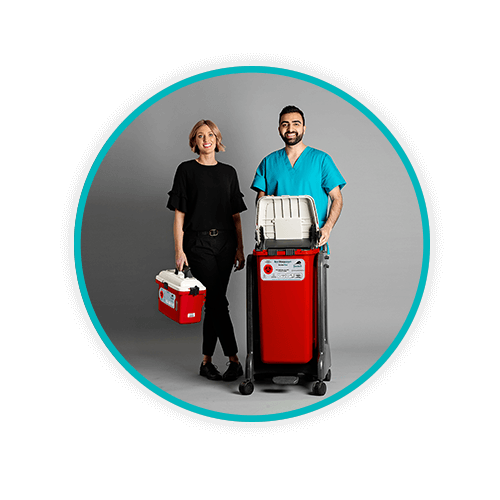What Is a Biomedical Waste Generator?

Biomedical waste is any solid or liquid waste contaminated with blood, human body fluids, or other materials that could potentially spread infections. A biomedical waste generator refers to any individual or an entity whose activities produce biomedical waste.
TOPICS WE WILL COVER:
1 / Understanding Biomedical Waste
2 / What is a Biomedical Waste Generator?
3 / Relevant Regulations for Biomedical Waste Generators
4 / Healthcare Facility Obligations
5 / The Daniels Health Approach
7 / Get Started With Professional Biomedical Waste Disposal
Understanding Biomedical Waste
Biomedical waste is a broad category of waste that encompasses a number of subcategories requiring separate disposal. Examples of biomedical waste include gauze, bandages, or other items saturated with blood.
-
Subcategories: Sharps waste, pathological waste and anatomical waste (a subcategory of pathological waste comprising materials that are recognizably human). Each biomedical waste type has unique handling requirements and cannot necessarily be disposed of in the same containers.
-
Synonyms: Other terms include biohazardous waste, regulated medical waste (RMW), red bag waste, medical waste, and infectious waste.
To learn more about biomedical waste, read our blog here.
What is a Biomedical Waste Generator?
A biomedical waste generator can be an individual (e.g., doctors, nurses) or an entity (e.g., hospitals, clinics, veterinary practices) whose activities produce biomedical waste.
-
Further Examples of Generators: Clinics, blood banks, surgery centers, dialysis centers, laboratories, funeral homes, pharmacies, tattoo parlors, med spas, and acupuncture facilities.
Relevant Regulations for Biomedical Waste Generators
Biomedical waste is primarily regulated by federal and state environmental and health departments. The Resource Conservation and Recovery Act (RCRA) provides a framework for managing hazardous waste but does not specifically address biomedical waste.
-
Regulatory Overview: Although medical waste is primarily regulated by state environmental and health departments, RCRA provides a framework for managing hazardous waste, emphasizing cradle-to-grave responsibility.
-
Cradle-to-Grave Responsibility: Under RCRA regulations, the biomedical waste generator is responsible for the waste from the point of generation through final disposal. This includes ensuring compliance with various state and federal regulations. For more details on cradle-to-grave responsibility, refer to our article on Cradle-to-Grave Responsibility.
Healthcare Facility Obligations
-
Proper Waste Handling: Facilities must ensure proper segregation, labeling, and storage of biomedical waste.
-
Compliance: Adherence to specific biomedical waste disposal methods that comply with regulations is crucial. This includes using licensed removal services for transportation to approved treatment and disposal facilities.
The Daniels Health Approach
Choosing a reliable waste partner is an essential step for an effective biomedical waste management plan. Daniels Health stands out as a top choice due to our comprehensive approach to waste management, which ensures safety, compliance, and efficiency throughout the entire process.
- Customer-Centric Solutions: Daniels Health starts by understanding your facility’s unique waste management needs. We then tailor our services to meet each client’s specific requirements.

- Clinically-Designed Containers: Daniels Health provides hands-free, leakproof, tamperproof, and securely lockable containers to prevent medication theft and contamination. Our medical waste containers are designed to meet the highest safety standards and have been tested rigorously to ensure durability. For more information, explore our Biomedical Waste Disposal Services and Medismart containers.
- Education: Daniels Health places a strong emphasis on education and employee training, helping facilities improve segregation efficiency and safety. By educating staff on proper waste management practices, Daniels Health helps reduce overall waste management costs.
Why Choose Us
Daniels Health has successfully optimized waste management systems for numerous facilities globally and here in the US. Explore our case studies here.
- Reliability: Ensure waste is managed safely and efficiently once it leaves your facility. Daniels Health has a proven track record of providing reliable waste management services that meet all regulatory standards.
-
Compliance Checks: Daniels Health conducts thorough compliance checks, ensuring that all aspects of waste management adhere to federal, state, and local regulations.
-
Proper Packaging: Daniels Health ensures that all containers used for waste disposal are not rusted or leaking and are fully sealed. Proper packaging and storage are critical to prevent the release of waste contents and potential contamination.
-
Secure Transport: Daniels Health uses licensed transport services with all necessary permits and adequate containment measures. This ensures the safe and secure transport of waste from the point of collection to the disposal facility.
Get Started With Professional Biomedical Waste Disposal
 Effective waste management is crucial for ensuring the health and safety of biomedical waste generators. Proper disposal techniques and compliance with regulations are essential to protect staff and patients from exposure to biohazardous materials.
Effective waste management is crucial for ensuring the health and safety of biomedical waste generators. Proper disposal techniques and compliance with regulations are essential to protect staff and patients from exposure to biohazardous materials.
Daniels Health is a top choice for biomedical waste removal services and containers, ensuring safety, compliance, and efficiency in all aspects of medical waste management. Our comprehensive solutions are designed to meet the specific needs of healthcare facilities and provide reliable and compliant waste management practices.
Contact Daniels Health for effective and compliant biomedical waste management solutions today.
Let's Talk!
Your time is valuable, and we don’t want to play hard to get. You can either phone us directly on the details listed on our contact page, or feel free to fill out this short form and one of our team members will get back to you as quickly as possible.

